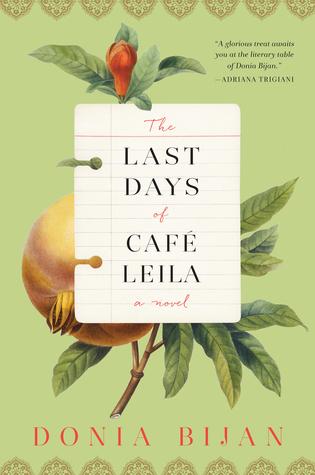 Part of my Reading All Around the World Challenge, this is a book written by a chef in the U.S. who was born in Iran. Café Leila tells the story of an Iranian family that experiences terrifying changes in the country after the revolution and establishment of the Islamic Republic in the early 1980’s.
Part of my Reading All Around the World Challenge, this is a book written by a chef in the U.S. who was born in Iran. Café Leila tells the story of an Iranian family that experiences terrifying changes in the country after the revolution and establishment of the Islamic Republic in the early 1980’s.
The book begins in the present day, with Noor, a nurse, packing a romantic anniversary picnic for her husband Nelson. When Nelson calls off on account of a work emergency, Noor brings the picnic to his workplace and sees him with another woman. Their marital difficulties bring about Noor’s decision to finally return to her birthplace, Tehran, and to introduce teenage daughter Lily to her grandfather.
I quickly got into this story, finding Noor’s situation quite interesting. The story stalled a bit, however, when the narration switched to her father Zod, in a lengthy description of his childhood, his marriage, and running Café Leila, his restaurant.
This is a book written by a chef, and is clearly Bijan’s honoring the flavors of her childhood. If you love reading about cooking, you’ll love this aspect of the book. I was a little less enthused. I really wanted much more historical information about what was happening in Iran at the time. We know there’s a revolt and a regime change, and then Bijan describes fear and oppression, but we’re never given any specifics.
But despite the early part of this book feeling a bit slow, the tension builds as we learn about what happened to Noor’s mother. Noor is sent to America as a teenager, for reasons that are never fully explained to her. Iran is the place of her cherished childhood, and all of her happy family memories, so it’s difficult for her to reconcile that with the country she returns to.
This is Bijan’s first novel (she has also written a memoir about her mother, cooking, and her childhood in Iran). It sounds like this book is very much based on Bijan’s own family experiences, which I appreciate. However, because the book didn’t give me a lot of historical context, I had to seek out more information about what happened in Iran in the late 70s and the situation today.
I had real difficulty with Noor’s attitude towards her daughter. I could understand bringing her to Iran against her will, because a teenager should meet family and learn about her history. And I know full well that a teenager dealing with her parents’ divorce isn’t going to be easy. But Noor is so blind to her daughter’s wishes, to the extent where she’s considering keeping her in Iran, away from father and friends, and forcing her to live in a world where women don’t have even the most basic freedoms. I just can’t for a minute understand that from a mother, although I do understand Noor’s own ambivalence towards the country she loves, and I do understand the difficulty she is having making even basic decisions about her life.
Also making this story problematic is Noor’s family withholding the real facts about what happens in Iran to women, which means Lily has no understanding of the dangers of the place she’s living in.
As a coming-home, finding-oneself novel, it has some touching moments. But I think this book would have been greatly helped by developing more multi-dimensional characters beyond Noor and her daughter. Noor’s father, his old nanny, and the staff who work at the Café Leila, are never more than idealistic images of what we’d like our family to be. And while Noor whole-heartedly dives into the working life of the Café, we’re never given a sense of the day to day conflicts or challenges she experiences, other than the wrath of her daughter. Does Noor miss her nursing job, or her life in California? Is she bothered by the restrictions on her dress or never going outside her home? Is it difficult to re-establish a relationship with the father she hasn’t seen in decades? There is one really compelling moment where Noor’s father tries to explain why he wants Noor and Lily to go back to the U.S., but then the issues raised in that moment are completely ignored.
In the end, I was hoping this book would wrestle with these issues in a more thoughtful way, but I was disappointed. I realize I’m bringing my Western, white sensibility to reading this book, but I was deeply troubled by what Noor, her mother, and her daughter experience. Instead of nuance and historical context, Bijan paints two extreme pictures of Iran – one of a close, loving family and a rich culture, and the other of a regime that governs by oppression, fear, and misogyny. While Noor comes to reconcile those two extremes, she never helps me, the reader, to do that as well.
Note: I received an advanced copy of this novel from NetGalley and publisher Algonquin Books. This book was published April 18, 2017.

